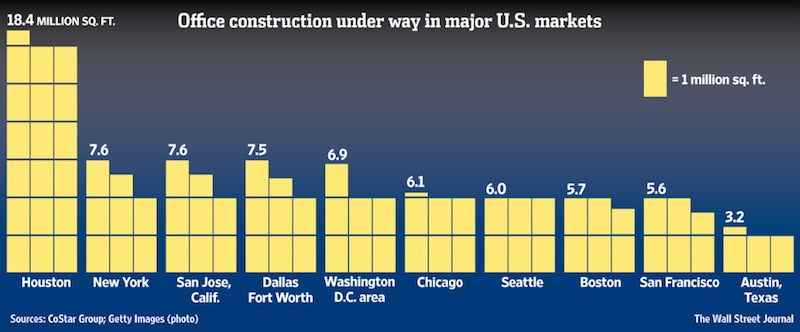A few days ago, The Wall Street Journal reported that one-sixth of all office space under construction nationwide is located in the Houston metropolitan area.
The Journal quoted the property data firm CoStar Group, which stated that by the end of 2014, 80 buildings with about 18 million sf of office space were started in Greater Houston.
This wouldn’t be earthshaking news—Houston, after all, continues to be one of country’s more vibrant markets, ranking 39th out of 300 of the largest metropolitan economies worldwide, according to the Brookings Institution’s Global MetroMonitor—were it not for the fact that all this office construction is occurring at a time when the price of oil—a commodity that helps lubricate Houston’s economic engine—has plummeted by more than 50% since last summer.
Several of the biggest energy companies have announced more than 30,000 layoffs worldwide, and a sizable number of those workers could be Houstonians. Fewer workers require fewer offices, and employers are already rushing to sublease the space they occupy, the Journal reports.
 Sources: WSJ, CoStar Group
Sources: WSJ, CoStar Group
In a follow-up story, the Journal reports that 13.2 million sf of office space are on schedule to be completed in 2015, the highest total since 1984.
CoStar now estimates that Houston’s vacancy rate could rise to 15.3% by 2016, from 10.8% at the end of 2014.
The newspaper singles out one development firm, Hines, that’s building a 48-story tower on spec, without tenants lined up, as an example of how certain companies suddenly find themselves exposed to a potential economic downturn. On the flip side, excess office space and higher vacancy rates could lead to lower rents, and opportunities to find existing space rather than building new.
HOUSTON NOT AS OIL DEPENDENT
But is Houston really headed for a fall? Not if you listen to some of the comments posted about the Journal article. One reader insisted that Houston is nowhere near as oil dependent as it was in the 1980s, when its housing market all but collapsed and nine of Texas’s 10 largest banks failed.
“Houston is twice as large as it was in 1980, and its dynamic economy is now twice as diversified,” one reader commented. “Also, the oil industry has fortified itself since 1980. Houston now boasts 11 major economic sectors in its massive economy.”
(Similar arguments about Louisiana’s supposedly more-diverse economy were made recently in an article published by The Advocate in Baton Rouge, La., which reported that only 13% of that state’s proceeds is now tied to mineral revenue, compared to 42% in the 1980s.)
A recent survey of Houston-area purchasing managers at 45 companies found that those not so tightly bound to oil prices—such as utilities and non-energy manufacturing—have seen a boost in new orders, production levels, and supplier purchases.
“We’ll have to see where things go in the next few months,” Ross Harvison, Chairman of the Institute for Supply Management-Houston Business Survey Committee, told the Houston Chronicle.
Even the Journal article acknowledges that any “bust” in Houston’s economy might turn out to be short term. The newspaper quotes Mike Mair, Executive VP in charge of Skanska’s construction in Houston, who says his company isn’t panicking about what he concedes could be as “soft” 2015. Skanska is currently building two 12-story towers, one of which doesn’t have tenants yet, and Mair says those projects will proceed. “I’m not afraid of ’16 and ’17,” he is quoted as saying.
Mair’s optimism is promulgated, in part, on long-range projections about Houston’s population, now at around 6.5 million. The Texas State Data Centers expects that people count to expand by an average 2.2 million residents per decade over the next 40 years.
Even with falling oil prices, Houston is expected to add 62,900 jobs in 2015, according to the Greater Houston Partnership. Most cities would welcome such a bounty, but the bar is set higher for Houston, which added 120,000 jobs last year.
Related Stories
Government Buildings | Aug 23, 2023
White House wants to ‘aggressively’ get federal workers back to the office
The Biden administration wants to “aggressively” get federal workers back in the office by September or October. “We are returning to in-person work because it is critical to the well-being of our teams and will enable us to deliver better results for the American people,” according to an email by White House Chief of Staff Jeff Zients. The administration will not eliminate remote work entirely, though.
Giants 400 | Aug 22, 2023
Top 115 Architecture Engineering Firms for 2023
Stantec, HDR, Page, HOK, and Arcadis North America top the rankings of the nation's largest architecture engineering (AE) firms for nonresidential building and multifamily housing work, as reported in Building Design+Construction's 2023 Giants 400 Report.
Giants 400 | Aug 22, 2023
2023 Giants 400 Report: Ranking the nation's largest architecture, engineering, and construction firms
A record 552 AEC firms submitted data for BD+C's 2023 Giants 400 Report. The final report includes 137 rankings across 25 building sectors and specialty categories.
Giants 400 | Aug 22, 2023
Top 175 Architecture Firms for 2023
Gensler, HKS, Perkins&Will, Corgan, and Perkins Eastman top the rankings of the nation's largest architecture firms for nonresidential building and multifamily housing work, as reported in Building Design+Construction's 2023 Giants 400 Report.
Affordable Housing | Aug 21, 2023
Essential housing: What’s in a name?
For many in our communities, rising rents and increased demand for housing means they are only one paycheck away from being unhoused. It’s time to stop thinking of affordable housing as a handout and start calling it what it is: Essential Housing.
Adaptive Reuse | Aug 16, 2023
One of New York’s largest office-to-residential conversions kicks off soon
One of New York City’s largest office-to-residential conversions will soon be underway in lower Manhattan. 55 Broad Street, which served as the headquarters for Goldman Sachs from 1967 until 1983, will be reborn as a residence with 571 market rate apartments. The 30-story building will offer a wealth of amenities including a private club, wellness and fitness activities.
Sustainability | Aug 15, 2023
Carbon management platform offers free carbon emissions assessment for NYC buildings
nZero, developer of a real-time carbon accounting and management platform, is offering free carbon emissions assessments for buildings in New York City. The offer is intended to help building owners prepare for the city’s upcoming Local Law 97 reporting requirements and compliance. This law will soon assess monetary fines for buildings with emissions that are in non-compliance.
Office Buildings | Aug 15, 2023
Amount of office space in U.S. is declining for the first time, says JLL
In what is likely a historic first, the amount of office space in the U.S. is forecast to decline in 2023, according to Jones Lang LaSalle. This would be the first net decline according to data going back to 2000, JLL says, and it’s likely the first decline ever.
Office Buildings | Aug 14, 2023
The programmatic evolution of the lobby
Ian Reves, Managing Director for IA's Atlanta studio, shares how design can shape a lobby into an office mainstay.
Office Buildings | Aug 10, 2023
Bjarke Ingels Group and Skanska to deliver 1550 on the Green, one of the most sustainable buildings in Texas
In downtown Houston, Skanska USA’s 1550 on the Green, a 28-story, 375,000-sf office tower, aims to be one of Texas’ most sustainable buildings. The $225 million project has deployed various sustainable building materials, such as less carbon-intensive cement, to target 60% reduced embodied carbon.

















